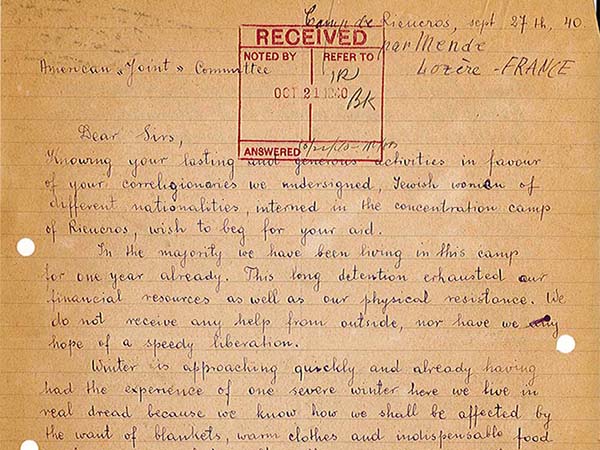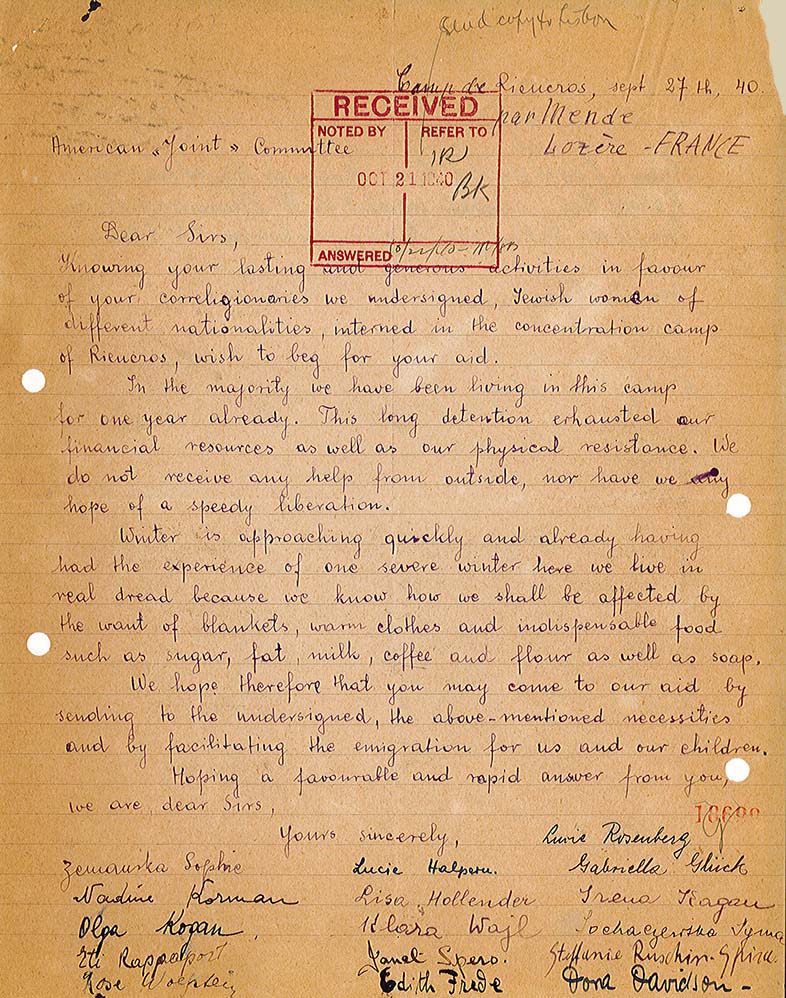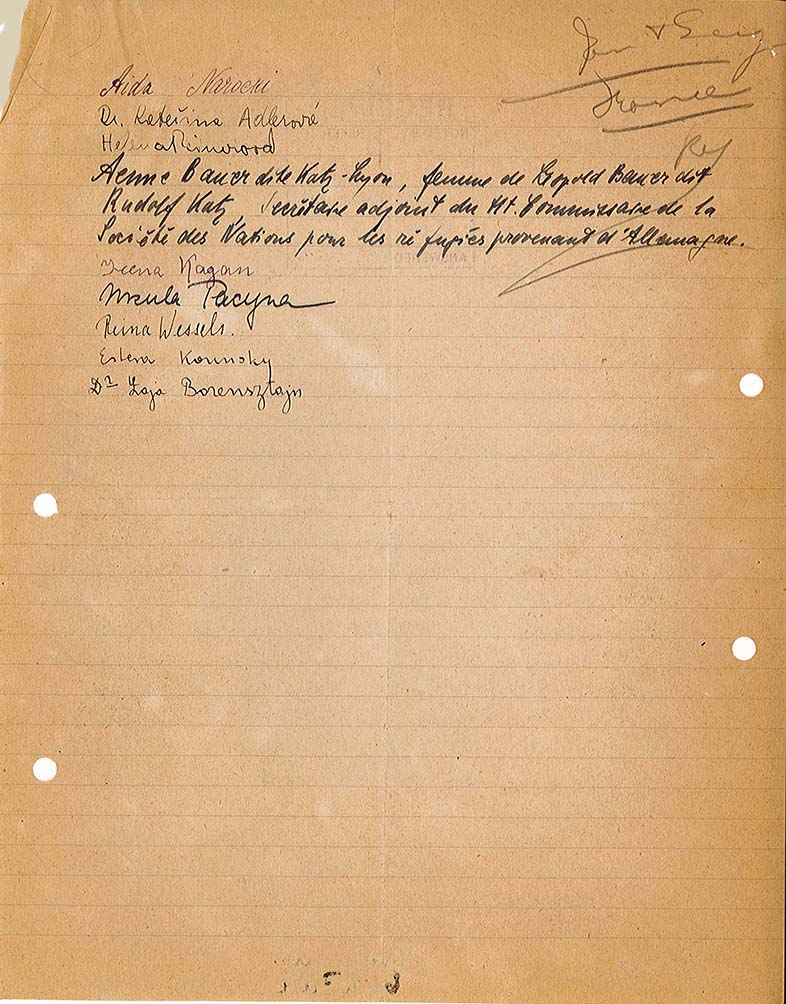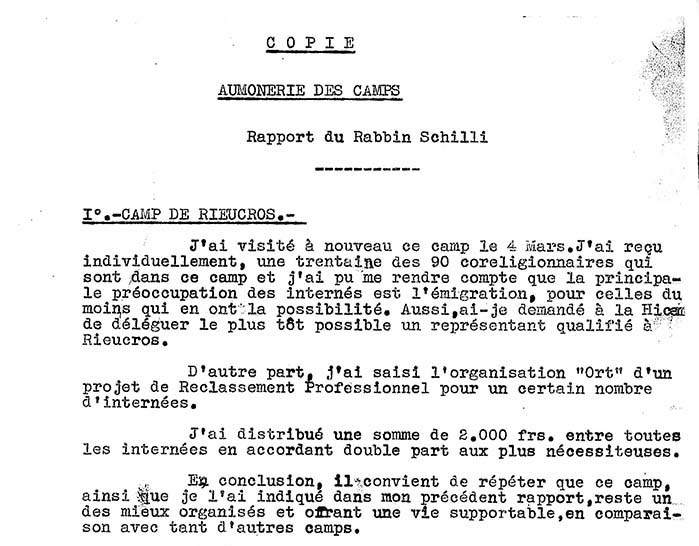
The Women of Rieucros
A letter signed by women interned at Rieucros is found in the Archives.
Though it’s been over eight years since I started working as a processing archivist in the JDC Archives, I am still surprised from time to time with the incredible material we have in our collections. That being said, we tend to already know about these items—until now. In doing some digging through our collections for a recent project, we came across a fascinating letter which took me and a colleague down a research rabbit hole.
To you, the reader, it may look like nothing more than your regular, run-of-the mill letter at first glance. But if you look more closely, you’ll see that there’s so much more to it than meets the eye.
Letter sent to JDC from the women of Rieucros. September 27, 1940. (JDC Archives)
The letter, dated September 27, 1940, was sent to JDC-New York and begins:
Dear Sirs,
Knowing your lasting and generous activities in favour of your co-religionaries we undersigned, Jewish women of different nationalities interned in the concentration camp of Rieucros, wish to beg for your aid.
The letter writers continue, asking JDC for “ . . . blankets, warm clothes, and . . . food” and for help in “ . . . facilitating the emigration for us and our children.” At this point, the women had been in the camp for over a year—no money, their “physical resistance” was “exhausted,” winter was approaching, and they had no idea how they would make it through. The letter is signed, individually, by 25 women.
The letter is reminiscent of many that were sent to people and organizations at this time—but my colleague and I had some questions. How did these women know to write to JDC? And how did we respond to them? Unfortunately, we don’t have answers to either of those questions. One can only imagine that JDC’s earlier relief efforts were well known, and these women knew that we could be a source of assistance. We also do not know how we ever responded to them, if we did at all, which also means we do not know if we rendered these women any aid.
Before we started, we wanted to learn more about Rieucros, the camp in which they were being held. Rieucros was initially opened by French Prime Minister Édouard Daladier in 1939 as a place to imprison members of the International Brigade who were refugees in France after the Spanish Civil War—this eventually included those deemed to be “undesirable” foreign women, as well.
Report sent to JDC by Rabbi Henry Schilli. March 10, 1941. JDC Archives, item ID 476574)
In our research, we found a report sent to JDC dated March 10, 1941, by Rabbi Henry Schilli, director of the Jewish Chaplaincy in the French army and chaplain of concentration camps in France during World War II. He wrote that during his visit to Rieucros he met with 90 Jews imprisoned there. Rabbi Schill distributed 2,000 Francs to the internees, giving a double portion to those who were the neediest. He concluded that the camp is better organized and offers a more bearable life as compared to the other camps out there—a distinction that likely meant very little to those imprisoned there at the time. Given the date of this report, it’s possible that this was JDC’s response to the letter in question—though we’ll never know for sure.
That got us to thinking again. Whether or not we helped these women, what became of them during/after the war?
Looking at the signatories of the letter more closely, this is where it got interesting for us. We thought the chances of finding information on these women would be rather slim, but to our surprise we learned quite a bit. Among these women were an actor, doctor, lawyer, chemist, and activists—mostly Communist—who were some of those “undesirable” women that Rieucros was known for holding. While we could not find information on every woman who signed the letter, we would like to highlight some of them and their stories here.
- Dora Schaul (nee Davidsohn) was born to a German Jewish family in Berlin. She was arrested as a Communist in 1939 and eventually transferred to Rieucros, where she stayed until she was moved to the Brens camp (another camp in France) in 1942. Dora escaped from Brens and joined the French Resistance, to whom she passed on important information she gathered while working in the Gestapo office in Lyons. She returned to East Berlin after the war, where she died in 2000.
- Steffie Spira, born in Austria, was a Communist theater actress during the Weimar Republic. After her arrest and imprisonment at Rieucros, Steffie escaped to Mexico. She returned to Germany in 1947 where she became a prominent actress in East German productions.
- Reina Melis (nee Wessels) was born in Amsterdam, trained as a baby nurse, and was a member of the Communist Party of the Netherlands. After marrying in 1938, she moved to Paris where she was arrested in 1939. After being held in La Roquette prison, Reina was interned in Rieucros until she was freed with the help of the Dutch consul in Toulouse. She was arrested again in 1943 and interned in the Noe camp in southern France. After escaping that camp, she began work as a nurse again and, like Dora Schaul, also worked for the French Resistance.
- Anne Bauer was the wife of Leopold Bauer who, from 1936-1939, served as Assistant Secretary to the League of Nations High Commissioner for Refugees from Germany. She was later actively involved in the Jewish Social Committee of the Brens Camp.
These are only a few of the women who signed this letter; all of them Jewish, most of them Communist, all working towards a common goal—freedom. While we will never know for sure, I’d like to think that JDC helped them out. But who knows? Could the Jewish chaplain’s visits have been connected to the letter sent to JDC by the group of 25 Jewish women interned at Rieucros? Maybe years from now, another JDC archivist will find more information on this—and you’ll get to read about it.
Sources:
Leo Bauer. (2022, July 30). In Wikipedia. https://en.wikipedia.org/w/index.php?title=Leo_Bauer&oldid=1101258339
Reina Melis. (2017, March 15). In DRAFD Wiki (German). http://wiki.drafd.org/index.php?title=Reina_Melis&oldid=3842
Rieucros Camp. (2022, July 6). In Wikipedia. https://en.wikipedia.org/w/index.php?title=Rieucros_Camp&oldid=1096805815
Dora Schaul. (2022, July 3). In Wikipedia. https://en.wikipedia.org/w/index.php?title=Dora_Schaul&oldid=1096200170
Steffie Spira. (2022, January 16). In Wikipedia. https://en.wikipedia.org/w/index.php?title=Steffie_Spira&oldid=1000801790
About the Author
Rebecca Weintraub is the Senior Processing Archivist at the JDC Archives.





